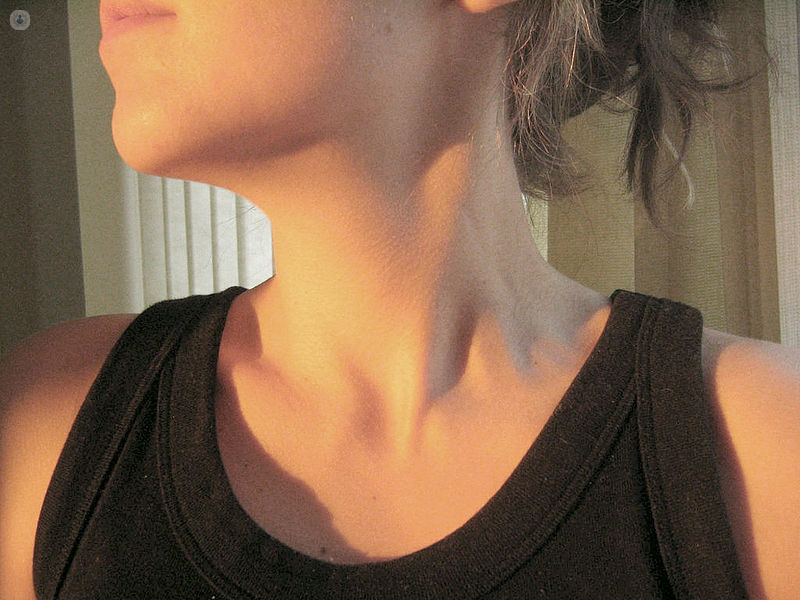What is endocrine surgery? An expert’s guide to the thyroid and parathyroid glands
Autore:Endocrine surgery is surgery performed to remove all or part of an abnormal endocrine gland. Endocrine glands secrete hormones that have an effect on the way the body works away from the vicinity of the gland secreting the hormone. Examples of endocrine glands include the thyroid and parathyroid glands. Expert endocrine and general surgeon Mr James Kirkby-Bott explains:

Thyroid and parathyroid glands
The thyroid gland (humans have one) and parathyroid glands (humans usually have four) both exist in the neck. The thyroid lies over the windpipe (trachea). It is usually the size of two Brazil nuts and appears smooth. It is shaped like a butterfly with a lobe (wing) each side of the trachea and an isthmus (body) between the 2 wings. The parathyroids exist on the surface of the thyroid gland. They are small – usually 6x4x2mm in dimension and difficult to find, with a very fragile blood supply. Because the hormones they produce are so important, we have more of these glands than are essential for life, in case they stop working normally or are damaged.
The thyroid controls metabolism and the metabolic rate of the body. While there are many other factors that influence metabolism (such as body size, genetics, workouts, and meal size and timings), the thyroid gland secretes a hormone called thyroxine that makes metabolism happen as it does.
The parathyroids are also very important and secrete a hormone called parathyroid hormone or PTH for short. PTH has a major role in controlling bone turnover and re-modelling. It keeps our blood calcium levels regular and the calcium is used for a huge range of cell functions, including muscle contraction. The bones require it for their strength too. The body stores calcium in the bone, where it has an important structural role, and uses continual turnover of calcium (via the hormone PTH) into and out of the bone to control blood calcium levels, so it is available for immediate use as needed. It works in conjunction with vitamin D, which controls absorption of calcium from the gut and helps to modulate the role of PTH.
Why might the thyroid or parathyroids need to be removed?
The thyroid can be underactive (not secreting enough hormone; this is known as hypothyroidism). This is common and is treated not with surgery, but with a thyroxine replacement tablet called levothyroxine.
The thyroid can be overactive (hyperthyroidism) and produce too much thyroxine. This is dangerous and needs treatment with drugs that usually make the gland function normally again. However, the thyroid gland can then relapse and become overactive once more. Eventually, due to the side effects of the drugs used to control this overactivity, it is necessary to remove the thyroid. This can be done surgically with an operation or by swallowing a special radioactive tablet (radioactive iodine) that destroys the thyroid gland without needing an operation. All these treatments have their own risks and benefits and some people are better suited to one rather than the other course of action if they have an overactive thyroid.
Over- and underactive glands usually happen as part of an autoimmune condition. Underactive glands are usually due to Hashimoto’s thyroiditis and this condition is not amenable to surgery. Overactive glands are due to Grave’s disease. This can be treated by an operation that removes all of the thyroid gland. However, it can be difficult and needs someone that understands the disease to achieve the best outcomes.
Nodules are very common in the thyroid gland. The vast majority are benign (not cancerous). It is not always possible to distinguish a cancerous nodule from a benign nodule without surgery. When this happens, we recommend removing the lobe (butterfly wing) and isthmus (butterfly body) with the nodule in it to get a diagnosis. Sometimes these nodules can be large enough to cause local compressive symptoms in the neck. Either difficulty swallowing or a choking sensation when lying down. To improve these symptoms is another reason for performing thyroid surgery. Depending on the size and number of enlarged nodules either a thyroid lobe or the whole gland (both lobes) are removed.
In parathyroid problems one of the four glands can become overactive. This is called primary hyperparathyroidism. In these cases we look for which gland is enlarged and overactive and then operate to remove that gland. This restores the body calcium level to normal and can cure the problem.
How is it done?
For both glands the surgery is done under general anaesthetic, so the patient is asleep. The patient usually stays overnight for thyroid operations or goes home the same day for parathyroid operations. The scar tends to heal quickly and neatly in the neck. The patients tend to have minimal pain post-surgery, but often feel like they have had a cold, with a sore throat that lasts 7-10 days. Risks of the surgery are low but the consequence is not negligible and it is important that the risks are discussed face to face as part of the decision-making process before deciding on surgery.


